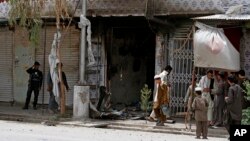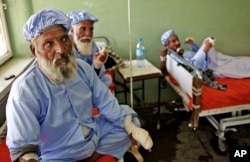No one in Afghanistan expected the political rivalry between presidential candidates Ashraf Ghani and Abdullah Abdullah to end after Saturday’s run-off vote, and it has not.
Both are claiming evidence of fraud, laying the groundwork to potentially challenge the result of the vote, which is not expected to be announced until next month.
Electoral Complaints Commission spokesman Naderi Mohsini said the panel has received hundreds of reports of irregularities, including by election officials and security forces.
Mohsini said the commission’s commitment to the people of Afghanistan, to the candidates and the electoral process is if presented with documentation and evidence of electoral irregularities, it is the commission's responsibility to deal with it.
Officials are concerned continued political fighting between Ghani, a Pashtun former World Bank official, and Abdullah, a Tajik former foreign minister could spill onto the streets.
Both have the support of warlords, officials said.
"Respect the due process"
U.N. special representative to Afghanistan Jan Kubis called for patience.
“Respect the due process, respect the work of the commissions, do not jump to conclusions, do not make statements, comments, in anticipation of the results," Kubis said. "Be also ready to accept the results of such process. There can be only one winner."
Official preliminary results are not expected until July 2.
Kabul resident Jamila, one of 7 million Afghans who defied repeated Taliban threats and came out to cast her vote on Saturday, said the candidates should focus less on politics and more on the needs of the country.
Jamila sent a message to the candidates: Make a better future for Afghanistan, create a good future for our children, build schools for them, provide better security for them, and build a better economy.
The winning candidate will succeed President Hamid Karzai who has led Afghanistan for the past 12 years.
Karzai’s government has been accused of massive corruption.
Analyst Mir Ahmad Joyenda said any new leader should sign a Bilateral Security Agreement with Washington, as well as work together with the political opposition or risk having the country divide along ethnic lines.
“If they are not cooperating with each other, they cannot have backing from international community, and the people of Afghanistan will not build their trust in them,” Joyenda said.
The White House has said it is ready to work with the next Afghan leader, regardless of who wins the vote.
Strong turnout
Turnout for Saturday's election was high, despite the Taliban's threat to disrupt the vote with violence.
Election officials said Sunday that 7 million Afghans voted, which would be similar to the first round on April 5, and a turnout of about 60 percent of eligible voters.
The Interior Ministry reported 150 attacks, including roadside bombs and rocket firing. Among dozens of people reported to have been killed by militants, the worst attack blew up a bus killing 11 people, including several election worked returning home from the polls.
Many people in the capital, Kabul, proudly showed their ink-stained forefingers to prove they had voted.
But in western Afghanistan the Taliban cut off the ink-stained index fingers of at least 11 civilians, to punish them for taking part in the political process.
A U.N. Assistance Mission in Afghanistan statement strongly condemned the mutilation as an act of inhuman cruelty.






